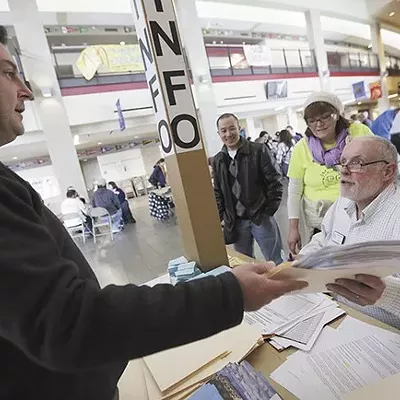Tuesday, September 13, 2016
With Condon recall rejected handily, recall leader Green says city should move on
In the weeks before the recall went before a judge, Mayor David Condon condemned the effort as a coordinated, political attack against him.
But after Yakima County Superior Court Judge Blaine Gibson dismissed the recall charges one by one, recall petitioner David Green made a statement wildly divergent with that conclusion: Let's move on, and stop attacking the mayor for this.
"I think we should focus on the future and put this matter behind us," says Green, a certified public accountant and the chair of the 3rd legislative District Democrats. "I think it would be good to stop taking potshots at the mayor with respect to the [former police chief Frank] Straub affair. I think with the court making a determination that the recall petition was not actionable those issues should be off the table now and we should move forward."

Daniel Walters cellphone photo
Recall petition filer David Green says the city should move on and heal now that the recall is dead
"That's beyond my pay grade," he says.
Green's willingness to move on is not a total surprise. In an interview with the Inlander last month, he suggested that he'd push for closure if the judge rejected his petition.
"If the judge says these are not valid grounds to moving forward, then the community needs to take the signal that we should heal," he said.
In a press release, City Council President Ben Stuckart, who's been one of the mayor's biggest critics for how he handled the issues concerning Straub, echoed Green's call for healing.
"Now the entire city must turn the page, leave this ugly chapter in the past, and move forward. I am confident that Mayor Condon shares my belief that Spokane’s future is bright," Stuckart wrote. "I am glad to have this behind us. It is time for us at City Hall to move on, repair our damaged relationships, and continue working for all the citizens of Spokane."
And the #RECALLCONDON Facebook page? They just changed their title to "#RESIGNCONDON." And then back to "#RECALLCONDON" again."I think it would be good to stop taking potshots at the mayor with respect to the [former Police Chief Frank] Straub affair." — recall petitioner David Green
"There's talk that this is not completely over," #RECALLCONDON founder Ben Rall writes. "For the next 24 hours, please vote on the possible name change, or add your own idea."
The hearing itself was largely a
Green has two law degrees but does not have a license to practice in Washington state. Despite this, he represented himself, attempting to answer Gibson's legal questions without a lawyer.
We'll go through each charge individually to explain why the judge rejected it:
Charge 1: Condon intentionally withheld public records concerning former Police Chief Frank Straub until after the election.
Green thought this was his strongest charge. But while he attached hundreds of pages, including the 126-page summary of the "Seabold report" compiled by independent investigator Kris Cappel, he didn't attach any of the interview transcripts associated with it. And that was the problem.
"This charge is based entirely on the Seabold report," Gibson said. "Did what you file include the appendices and transcripts that were referred to in the Seabold report?"
While a recall petitioner like Green doesn't have to prove the factual accuracy of events, he does have to show specific evidence of "personal knowledge" of "misfeasance" "malfeasance" or a "violation of the oath of office."
"Well, Mr. Green, you had no personal knowledge of the events for the issue," Gibson said. "Ms. Cappel also had no personal knowledge of the event. She drew conclusions from interviewing witnesses and documents."
And without the transcripts, Gibson couldn't assess whether anyone had that direct personal knowledge.
Green argued that the documents were not readily available to the public. In fact, they are all posted on the city's website.
Without those documents, Gibson rejected the first charge.
Charge 2: Condon lied at a press conference when he told the Inlander, "No" when asked if there had been "any sexual harassment complaints lodged against Frank [Straub]" when, in fact, former police spokeswoman Monique Cotton had made sexual harassment allegations against the police chief.
This mirrors an ongoing complaint before the Ethics Commission. But while the Ethics Commission has been focusing on the definition of the word "complaint," Gibson went in another direction: He focused on the definition of the word "lodged."
"Is there a difference between 'lodging' a complaint or 'making' a complaint?" Gibson asked. "The problem is one of semantics... I think most people would understand the word lodged to refer to something more formal than simply complaining."
Gibson asked Green if the complaint had been made only orally, and Green says they had.
By contrast, the Center for Justice's Rick Eichstaedt has argued before the Ethics Commission that since Cotton's concerns were brought up in writing with Theresa Sanders, via a text message, it counts as the dictionary definition of lodged.
But here, Gibson felt that a semantic debate didn't rise to the level of a recall.
"My concern is that I don't think a recall should be based on a concern over semantics," he concluded. "I don't think it's legally sufficient."
3) Condon violated the city charter by initially stating that he did not, at that point, have plans to bring police chief appointee Craig Meidl to the city council for confirmation.
Gibson's issue here concerned the city charter itself. Did the charter require the council to confirm the police chief before the mayor appointed him?
"Is there a municipal code that specifies whether the approval by the city council has to come before the appointment is affected?" Gibson asked. "Is it specified in the code?"
In fact, the city council just passed an ordinance last night, laying out specific timelines for the mayor to submit his appointees for council approval.
"I can certainly understand why the city might want to modify their ordinance on this
4) Condon violated city policies in the way he handled a sexual harassment allegation raised against Straub by former police spokeswoman Monique Cotton.
This, again, came back to the Seabold report. And this one gets a little complicated. The report concluded that the outcome of how the Cotton complaint was handled following city policies, but the mayor had failed to consult with the city's sexual harassment policy when handling it.
"By not even considering the policies, [Condon] has violated his oath of office," Green argued.
Gibson wrestled with this argument longer than the others. Does the mayor have to consult the policy every time?
"With each
Gibson concluded there was no violation.
"To say an elected official violated his oath of office by not consulting a policy... it is so ephemeral," Gibson says. "A charge to support a recall has to be substantial."
And that was it. The recall petition was dead.
"I'm finding that issue four is both factually and legally insufficient," Gibson said. "Having found that all of the charges are factually and legally insufficient, I am dismissing the case."
—-
Here's the Condon's full statement on the recall result:
“Today’s decision was the right result. With the recall petition dismissed, I look forward to continuing to do the work the voters hired me to do – fixing our streets, growing jobs, bringing down property crimes, and ending homelessness. It is my highest honor to serve the people of the City of Spokane.
The City has already begun taking steps to avoid this situation going forward. As part of my 21st Century Workforce initiative, I have directed my staff to review and revise the City’s policies surrounding harassment allegations. I have also directed a review of our public records requests process, and will soon be empaneling a Blue Ribbon Commission to do a deep dive on public records policy, using Spokane as a case study.
One lesson I’ve learned from this experience is that the Mayor and City Council need to learn to work together for the good of the whole city, and put politics to the side. I agree with Council President Stuckart that Spokane’s future is bright and look forward to working with him and the rest of the Council to make Spokane the City of Choice.”
Tags: David Condon , David Green , Recall Condon , Scandal at City Hall , News , Image






















